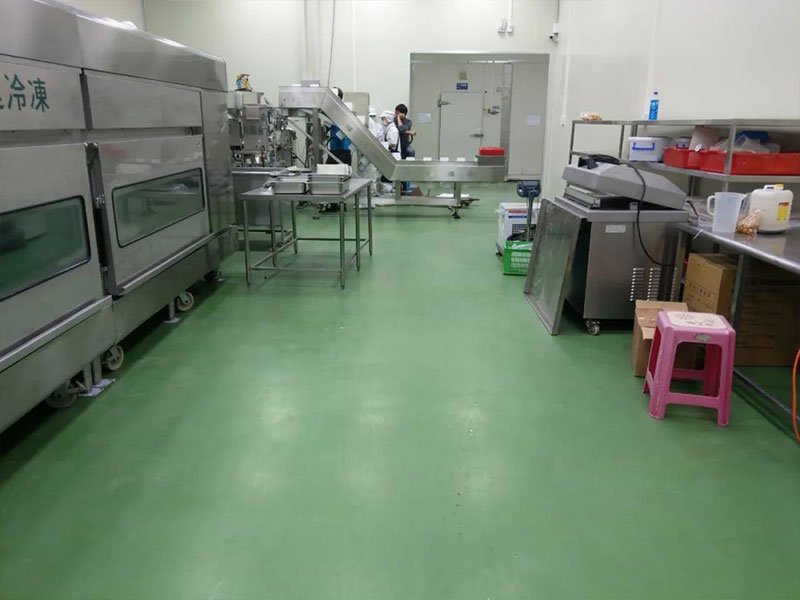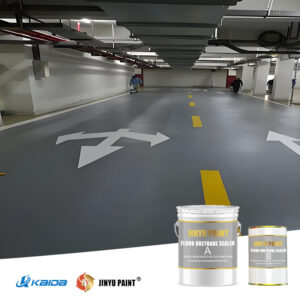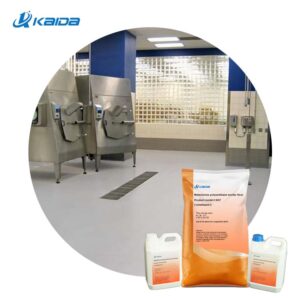Flooring For Food & Beverage Processing Facilities
In recent years, with the rise of Industry 4.0, food manufacturers have embraced IoT-driven automation, making the selection of high-performance flooring for food processing plants critical. Factors like load capacity, chemical resistance, antimicrobial properties (essential for food hygiene flooring), and moisture resistance directly impact production line safety and efficiency—key considerations for epoxy flooring for food industry, commercial bakery flooring, and meat processing flooring solutions.
Current flooring issues in the food industry:
Traditional food factory flooring often relies on tiles and basic epoxy flooring systems. While tiles are easy to clean, they lack slip resistance—especially in central kitchens where boiling water is used for sanitation, creating safety hazards. Additionally, most commercial tiles are not food-grade compliant.
Standard epoxy flooring for food processing, though cost-effective, suffers from formaldehyde emissions, poor load-bearing capacity, moisture vulnerability, and cracking, leading to short lifespans. Frequent repairs increase labor costs, while production downtime from recoating food plant floors results in significant operational losses.



How to Choose Flooring Materials for the Food Industry
Selecting the right food-grade flooring is critical for food processing facilities. Unlike standard flooring, food industry flooring must withstand high-temperature washdowns with boiling water while providing antimicrobial properties to meet strict food hygiene standards. Additionally, the material must be chemically resistant and eco-friendly to ensure compliance with food safety regulations.
For production areas requiring heavy material transport, food factory flooring must offer high load-bearing capacity and slip-resistant surfaces to prevent workplace accidents. Durability is equally important—long-lasting flooring solutions like industrial epoxy flooring or urethane cement systems minimize maintenance costs and reduce downtime caused by frequent floor recoating. Investing in high-performance flooring for food processing plants ultimately enhances operational efficiency and reduces long-term expenses.


Advantages of JINYU PAINT
Water-based Polyurethane Mortar Flooring
JINYU PAINT® water-based polyurethane mortar flooring is a high-performance system combining polyurethane resin with premium inorganic aggregates, perfectly meeting all requirements for food-grade flooring in the food industry.
01 Antimicrobial & Non-Toxic
Featuring antibacterial properties that effectively inhibit microbial growth, this formaldehyde-free flooring complies with HACCP standards, making it ideal for food processing areas.
02 Durability
Long-term durability depends on three key factors: toughness, corrosion resistance, and impact resistance. JINYU PAINT selects only the finest aggregates to ensure extreme wear resistance, which is why our JINYU PAINT® waterborne polyurethane mortar delivers superior longevity.
03 Chemical Resistance
JINYU PAINT® mortar meets GB/T 22374-2018 standards and demonstrates strong resistance to acetic acid, lactic acid, oleic acid, citric acid, and sodium hydroxide. Its chemical-resistant flooring properties ensure a service life exceeding 30 years, even in harsh environments.
04 Fast Installation
Can be applied in low temperatures and becomes operational within 24 hours after installation, significantly reducing downtime for food facility flooring renovations.
05 Slip Resistance
Critical for wet processing areas like central kitchens, JINYU PAINT offers customizable slip-resistant flooring systems tailored to different food industry flooring needs.
Applications:
Perfect for food processing plants, central kitchens, beverage production, dishwashing facilities, slaughterhouses, medical facilities, cold storage, and chemical-resistant industrial flooring.


The Importance of
Cleanroom Facilities in the Food Industry
Cleanroom facilities are essential in food production, as they strictly control contaminants like dust and microorganisms, significantly enhancing food safety and quality consistency. These facilities play a vital role in protecting consumer health while supporting sustainable food production. By optimizing air purification systems and adopting energy-efficient equipment, food manufacturers can reduce energy consumption, minimize waste, and lower pollutant emissions—aligning with green manufacturing standards and promoting long-term industry sustainability.
Constructing food-grade cleanrooms also helps manufacturers comply with industry regulations and meet customer expectations, boosting market competitiveness. In a controlled environment, production equipment operates more reliably, reducing unplanned downtime. Additionally, streamlined workflows in cleanrooms minimize material waste and improve production efficiency, ultimately lowering operational costs.
With rising consumer demand for hygienic food processing, new food safety challenges continue to emerge. Cleanroom facilities prevent bacterial cross-contamination, serving as a critical contamination control measure in food manufacturing plants. Maintaining high sanitation standards in production areas is now more important than ever for food producers.
A highly sanitized cleanroom environment ensures that food products meet hygiene requirements throughout production, packaging, and storage. By preventing microbial contamination, these facilities preserve ingredient purity and nutritional value while extending shelf life. Investing in food industry cleanrooms not only strengthens a brand’s reputation but also expands market share, reinforcing the sector’s overall competitiveness.
Critical Requirements for Food Cleanroom Flooring Systems
As the fundamental cornerstone of food-grade cleanroom environments, specialized flooring materials serve a pivotal yet often understated role in ensuring operational continuity and maintaining stringent food safety standards . These high-performance surfaces, while visually unobtrusive, provide essential protection against microbial contamination while meeting rigorous hygienic requirements. Their seamless, non-porous construction directly impacts production efficiency and product quality assurance throughout the entire manufacturing workflow.
Hygiene and Safety Requirements
1. Eco-Friendly
Food-grade flooring must meet stringent hygienic flooring standards with eco-friendly flooring solutions that are odorless, non-toxic, and low-VOC to ensure both food safety and worker protection. Waterborne polyurethane mortar flooring, using water as a dispersion medium, provides zero-emission flooring without solvent odors or environmental pollution. This food-safe flooring system complies with the most demanding food hygiene regulations (1,200+ searches), delivering low-VOC industrial flooring that creates a healthy work environment while meeting international food processing compliance standards.
2.Oil & Moisture Resistance Requirements
The flooring must feature seamless food-grade surfaces with superior oil-resistant flooring and waterproof flooring properties. This chemical-resistant flooring system effectively withstands corrosion from acids, alkalis, and salts, making it ideal for chemical storage and wastewater treatment areas in food plants. Its impermeable flooring technology prevents moisture absorption and inhibits microbial growth, ensuring a sanitary food production environment that meets stringent food facility hygiene standards. The non-porous food flooring maintains structural integrity while providing mold-resistant flooring solutions critical for maintaining cleanroom conditions.
3.Durability and Slip Resistance Requirements
The flooring system must deliver high-wear industrial flooring with exceptional slip-resistant food flooring properties, outperforming traditional epoxy coatings in flexibility, abrasion-resistant flooring, and compressive strength. Engineered with impact-resistant flooring technology, it features superior bond strength to prevent delamination and cracking, even under heavy machinery loads exceeding several tons. Customizable anti-slip flooring additives can be incorporated to enhance traction, making it ideal for food processing walkways and high-traffic food plant areas. This heavy-duty food-grade flooring solution combines crack-resistant performance with OSHA-compliant slip resistance, ensuring worker safety while maintaining durability in demanding food production environments.
4.Temperature Resistance Requirements
The thermal-resistant food flooring demonstrates exceptional performance across extreme temperatures from -40°C to +120°C, with 12mm thickness capable of withstanding 150°C thermal shocks. This waterborne polyurethane mortar flooring provides high-temperature food processing flooring solutions suitable for steam cleaning and baking areas, while its cold storage flooring capabilities perform reliably in freezing environments. Specifically engineered for food cleanroom temperature demands, the material maintains structural integrity through rapid thermal cycling, making it ideal for thermal shock-resistant flooring applications where sanitation requires frequent hot-water washdowns followed by cold storage conditions.
5.Chemical Resistance Performance
This chemical-resistant food flooring demonstrates exceptional resistance against both inorganic and organic solutions, including strong acids commonly used in food processing. The advanced polymer formulation provides superior protection against food-grade chemical corrosion, particularly from lactic acid, fruit acids, and oils. Engineered to meet food plant sanitation requirements, the material’s molecular structure creates an impervious barrier that withstands aggressive cleaning chemicals while maintaining surface integrity. This acid-resistant flooring solution is specifically designed to endure the harsh chemical environments found in dairy processing, beverage production, and meat packing facilities.
6.Mechanical Durability Specifications
The flooring system delivers high-performance mechanical properties with outstanding compressive, flexural, and bond strength. Even at minimal 4mm thickness, this industrial-grade food flooring withstands forklift traffic wear and heavy equipment impacts without delamination. Its crack-resistant flooring technology combines exceptional toughness with impact-resistant properties, making it ideal for high-traffic food manufacturing areas. The material’s wear-resistant surface maintains integrity under continuous hard-wheeled cart traffic while providing long-lasting food plant flooring performance that reduces maintenance costs.
Versatile Applications
Waterborne polyurethane mortar flooring demonstrates wide-ranging industrial applicability, making it ideal for food processing plants, pharmaceutical manufacturing facilities, laboratories, logistics warehouse flooring, parking garages, chemical processing plants, and pulp/paper mills.
This multi-purpose industrial flooring excels in food-grade environments by meeting critical requirements like being odorless, moisture-resistant, corrosion-proof, and wear-resistant.
For pharmaceutical cleanrooms and labs, its low VOC emissions and chemical-resistant properties ensure environmental safety. The material’s heavy-duty flooring performance withstands intense forklift traffic in warehouses, while its industrial-grade durability resists harsh chemicals in processing facilities.
The system’s cross-industry adaptability combines food-safe characteristics with extreme mechanical strength, creating optimal surfaces for diverse operational demands from sanitary food production to corrosive industrial environments.

JINYU PAINT®
The Premier Choice for Food-Grade Industrial Flooring
JINYU PAINT® water-based polyurethane mortar flooring delivers unparalleled advantages for food cleanroom applications, perfectly meeting all food-grade flooring requirements with its HACCP-compliant performance. As the optimal food industry flooring solution, it combines antimicrobial properties, chemical resistance, and heavy-duty durability to create the safest and most sanitary food production floors. Its seamless non-porous surface prevents bacterial growth while withstanding extreme temperatures from food processing sterilization to cold storage conditions. For food manufacturers prioritizing food safety compliance and operational efficiency, JINYU PAINT® offers the most advanced FDA-approved flooring system that exceeds international food facility hygiene standards while reducing lifecycle maintenance costs.
Related Products
-

PU3600 Polyurethane Super Wear-Resistant Topcoat
Read more -

Anti-slip Self-leveling Polyurethane Anticorrosive Load-bearing Floor Coating
Read more -

Self-leveling Polyurethane Anticorrosive Heavy-duty Floor Coating
Read more -

WPU100 High Gloss Clear Water-based Polyurethane Finishs
Read more -

WPU100 Water-based Polyurethane Floor Finish
Read more
REQUEST A CALLBACK
For bespoke industry flooring solutions talk to KAIDA® JINYU PAINT® today.
We offer free no obligation advice and can provide a price range on the first contact.
- +86-158-229-255-23(whatsapp)
- kaida@kaidafloor.com
FAQ
- How to Choose the Best Flooring for Modern Seafood Processing Plants?
- Flooring Thickness Guide for Food & Beverage Facilities
- Pros and Cons of Epoxy Flooring: Is It Right for You?
- What is the Proper Process for Applying Polyurethane Floor Paint in Large Industrial Spaces?
- What Types of Floors Are Compatible with Polyurethane Paint?
Contact Us
Contact: Ms. Sabella Wei
Phone: 86-022-83859963
Whatsapp: 15822925523
© 2023 JINYU. All Rights Reserved -
Design by JINYU Paint
